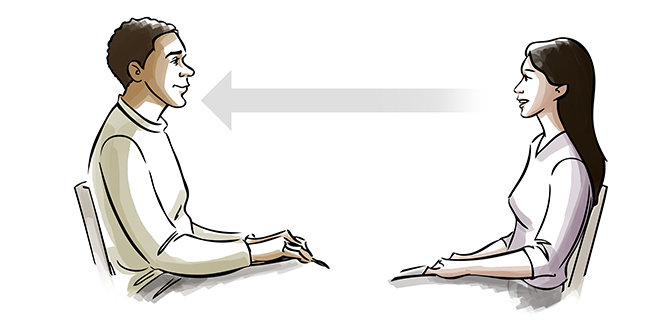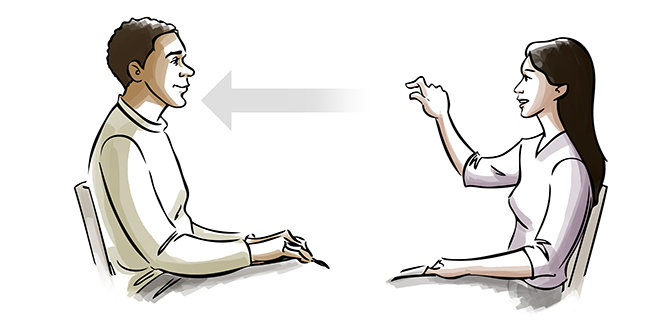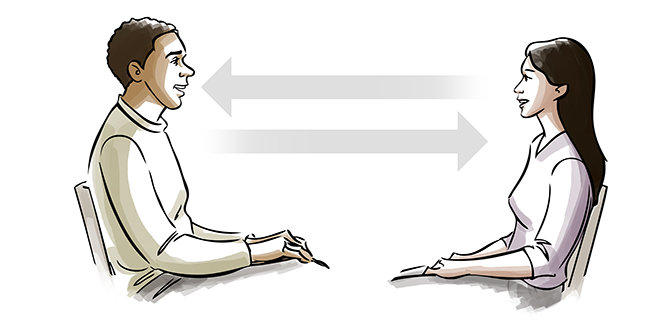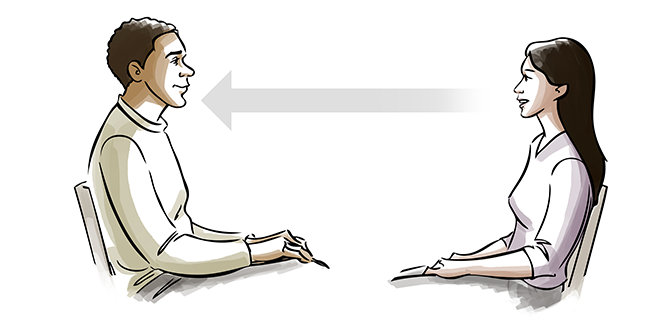Training 4: Originations
Definitions
It is important to understand the difference between an origination and a comment.
1. An origination is something another person says that is about him, his ideas, feelings or difficulties. For example, “I feel really tired all of a sudden” is an origination.
2. A comment is a statement or remark another person says that is just about you. For example, “Your shirt is nice,” “Your hair looks bad” and “You don’t know what you are doing” are all comments.
Originations and comments are totally different.
Originations by your coach are about him and how he is doing.
Comments by your coach are remarks about you that have nothing to do with the question or how he is doing. A comment is a remark about you said by your coach as an effort to not answer the question.
Originations are handled. Comments are disregarded.
Purpose
This drill teaches you to be able to recognize and correctly handle originations from another person. This drill also teaches you to recognize when another person gives an origination and to not be startled or thrown off by it, but to handle the origination smoothly and return to the question being asked. This drill further teaches you to recognize a comment as different from an origination and to disregard comments and return to the question being asked.
Position
You and another person are seated about three feet apart, facing each other.
Questions
On this drill, you ask the person across from you one of the following questions:
“do birds fly?”
Or
“do fish swim?”
Pick one of the questions to use in the drill and use it over and over. Do not mix the two questions.





Instructions
This drill is done as follows:
You: Ask your coach, “Do birds fly?” or “Do fish swim?”
Coach: When the student asks you the question, do one of the following:
1. Answer the question.
2. Occasionally, don’t actually answer the question, but instead make an origination from a list called an Origination Sheet (located at the end of this drill).
3. Occasionally, don’t answer the question, but instead say a comment.
You: If your coach answered the question, acknowledge the answer and then
ask the same question again, newly.
If your coach made an origination, handle the origination as follows:
1. Understand the origination.
2. Acknowledge the origination.
3. Handle the origination while maintaining communication with your coach.
4. When the origination is handled, return your coach to the question being asked.
If your coach said a comment, do not acknowledge it, but repeat the question.
Patter
The student’s failure to persist always gets a “That’s it” in any TR, but more so with this drill. The coach should always read from the Origination Sheet when making originations. It gives a list of various statements or remarks referring to how the coach feels or about his worries, etc. For example:
Student: “Do birds fly?”
Coach: “Yes.”
Student: “Thank you.”
Student: “Do birds fly?”
Coach: “I just remembered the last time I went swimming.”
Student: “Thanks for letting me know. Do birds fly?”
Coach: “Yes, they do.”
Student: “Very good.”
End Result
The drill is done until each of the following occurs:
1. You are able to recognize originations, handle them and return to the original question.
2. You are also able to recognize comments as different from originations, disregard them and get back to the original question.
3. Your coach is satisfied you can do so.
Origination Sheet
This sheet is used when drilling Training 4: Originations.
I have a pain in my stomach.
The room seems bigger.
I had a twitch in my leg.
I feel like I’m sinking.
The colors in the room are brighter.
I feel wonderful.
I just realized I’ve had a headache for years.
This is silly.
I feel all confused.
I’ve got a sharp pain in my back.
I feel lighter somehow.
I can’t tell you.
I feel terrible—like I’d lost something or something.
Wow—I didn’t know that before.
The room seems to be getting dark.
Say, this really works.
I feel very tense.
That wall seems to move toward me.
I feel like something just hit me in the chest.
I feel warm all over.
My head feels like it has a tight band round it.
I seem to see the wall behind my body.
It seems like I’m as tall as this building.
This chair is so comfortable I could go to sleep.
I keep thinking about that cop who blew his whistle at me this morning.
Things suddenly look a lot brighter.
Aren’t we finished with this yet?
I feel like I’m floating.
It looks like the wall is caving in on me.
That wall looks real thin.
Wow!!! W-o-w!!!!!!!
Ouch! Oh, ouch!
My face tingles.
I’m getting sleepy.
I’m starving. Let’s go to lunch.
I remember a time when I fell down and hurt myself.
Suddenly I’m so tired.
Everything is getting blurry.
Is this room rocking?
I just realized how wrong I’ve been all my life.
I feel like there is a spider’s web on my face.
My left knee hurts.
I feel so light!
Isn’t it getting hotter in here?
I just remembered the first time I went swimming.
My back has been aching like this for years.
Hold my hand.
I feel so lonesome.
I feel like I can’t talk.
My body is starting to shake all over.
My ribs hurt.
I feel just like the time I got run over by that car.
Everything seems to be getting dark.
No—no, no, no, no!!!!!!

